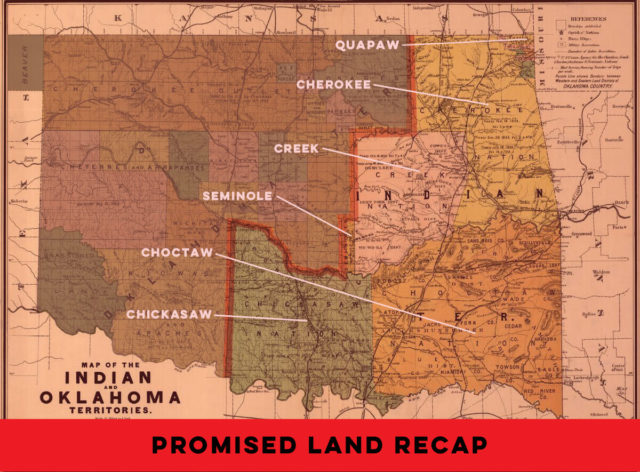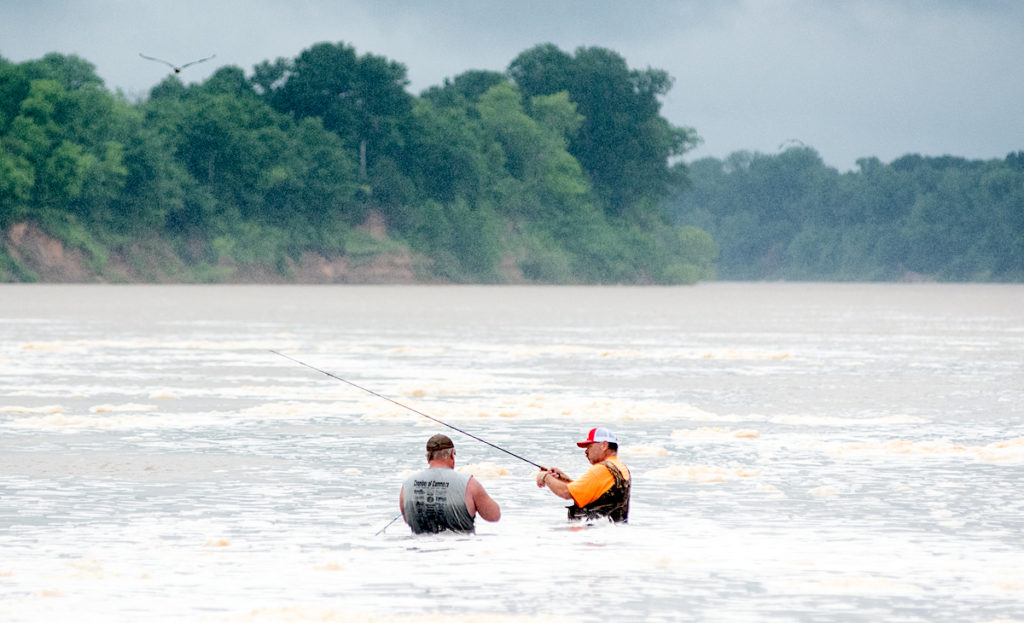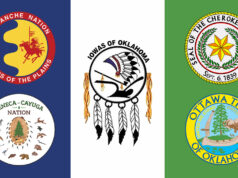
Throughout 2021, stories on the implications of the U.S. Supreme Court’s decision in McGirt v. Oklahoma have flooded news coverage in the state. However, keeping up with the complexities of the situation can be difficult, even for the most avid news readers.
In the past month, McGirt-related developments have included an order in a court battle over surface mining jurisdiction, a kerfuffle over hunting and fishing licenses and an apparent disagreement in the Stitt clan regarding the legal impact of McGirt.
To help you stay up to date on tribal affairs and the effects of the McGirt ruling as we trek into the new year, the following Promised Land recap offers a roundup of recent related stories from NonDoc and other Oklahoma Media Center collaborators.
State denies request for preliminary injunction on surface mining

On Dec. 22, U.S. District Court Judge Stephen Friot issued an order denying the state’s request for a preliminary injunction that would have blocked the federal government’s usurpation of regulatory authority over surface mining and reclamation operations on tribal reservation land in eastern Oklahoma.
This marks the first major court challenge regarding matters of civil jurisdiction in the wake of the landmark U.S. Supreme Court decision in McGirt v. Oklahoma.
Gov. Kevin Stitt’s administration and legal counsel will have the option of appealing the injunction denial or continuing to a full trial in front of Friot.
The case stems from a notice in the Federal Registry placed by the federal Office of Surface Mining Reclamation and Enforcement on May 18 blocking the state from holding regulatory authority over surface mining and reclamation operations on tribal reservation land in eastern Oklahoma. That notice transferred surface mining authority to the federal government.
During arguments on Dec. 2, state lawyers argued that the May 18 Federal Registry notice violated the Administrative Procedure Act by making a final agency decision without conducting a judicial review of the change. Additionally, state lawyers argued that a 2005 case — City of Sherrill v. Oneida Indian Nation of New York — provided “equitable doctrines” that take precedent on legal questions regarding civil jurisdiction arising from McGirt v. Oklahoma.
However, Friot did not buy the state’s arguments.
“Oklahoma has not shown a likelihood of success on the merits of its claims, and it is therefore not entitled to preliminary relief,” Friot wrote in his order.
Read a detailed explanation of Judge Friot’s order.
Water is for fighting
Speaking of detailed explanations, Alexander Ewald of The Enid News & Eagle published a Jan. 2 deep dive into a convoluted lawsuit involving efforts by the City of Enid and the Osage Nation to draw water through a new pipeline from Kaw Lake.
An Osage County landowner’s attorneys have argued that the tribal nation is effectively and improperly piggybacking on the City of Enid’s constitutional right to use eminent domain to place the pipeline on his property. They also argue that the McGirt v. Oklahoma decision means this civil law matter should be decided in federal court. Lastly, they alleged that the judge in the case should recuse because he has a personal financial interest in land he owns not being declared an Indian Country reservation. (That petition was rejected by the Oklahoma Supreme Court.)
Meanwhile, questions about which governmental bodies have ownership of the water in Kaw Lake and the Arkansas River also remain.
Keith Stitt cites SCOTUS ruling to fight speeding ticket
On Dec. 22, Gov. Kevin Stitt’s brother Marvin Keith Stitt, who goes by Keith, asked the Tulsa Municipal Court to dismiss a speeding ticket he received in February because he is a citizen of the Cherokee Nation. The story was first reported by Dylan Goforth and Clifton Adcock of The Frontier.
Keith Stitt’s attorneys, Sabah Khalaf and Brett Chapman, filed a motion asserting that the City of Tulsa cannot prosecute the violation on tribal land, pursuant to the ruling in McGirt v. Oklahoma.
Gov. Stitt — also a citizen of the Cherokee Nation — has repeatedly criticized the SCOTUS ruling and has made it clear that his administration hopes to see the decision overturned.
In a statement, the governor’s office said Keith Stitt’s case “shows the absurdity of the McGirt ruling.”
“It is preposterous to think that an Oklahoman is not subject to municipal traffic laws because they have a small fraction of Cherokee heritage that dates back many generations,” the statement said. “This case shows the absurdity of the McGirt ruling and how it is being abused and expanded to create unfair treatment for Oklahomans based on their race.”
Stitt declines to renew hunting and fishing compacts with Cherokee, Choctaw nations

Gov. Kevin Stitt’s office confirmed Dec. 13 that he would not renew the state’s hunting and fishing compacts with the Cherokee and Choctaw nations. The agreements expired Dec. 31.
The compacts were first signed in 2015 and 2016, allowing for the two tribes to purchase combination hunting/fishing licenses for their citizens at only 5 percent of the cost for other Oklahomans, including other tribal citizens. The purchase compacts drew federal matching dollars for the state’s wildlife and conservation efforts.
Stitt’s chief of communications, Charlie Hannema, pointed to the price difference in combination licenses for Cherokee and Choctaw citizens compared to other Oklahomans: about $2 per license for Cherokee and Choctaw citizens and $42 per license for most other adults.
“Gov. Stitt believes that all Oklahomans should receive equal treatment under the law and offered both the Cherokee Nation and the Choctaw Nation the opportunity to enter into a compact to purchase licenses for their members by paying the same price as Oklahomans who are not tribal members,” Hannema said in a statement.
Both compacts included a minimum license purchasing threshold for the two tribes. The Choctaw Nation compact required the tribe to purchase a minimum of 50,000 adult licenses by June 30 of each year, and the Cherokee Nation agreed to purchase at least 150,000 licenses.
However, statistics from the Oklahoma Department of Wildlife Conservation show that neither tribe has ever reached the minimum purchasing amounts agreed to in the compacts. Cherokee Nation license sales have hovered between 75 percent and 85 percent of the compact minimum, and Choctaw Nation license sales have topped out around 43 percent of the compact minimum.
Tribal leaders wrote letters to Stitt criticizing his decision to allow the compacts to expire. Choctaw Nation Chief Gary Batton wrote that the Choctaw Nation “will begin exercising our jurisdiction to regulate hunting and fishing within our reservation boundaries and beyond.” Cherokee Nation Chief Chuck Hoskin Jr. wrote that “various treaties” guarantee the hunting and fishing rights of Cherokee Nation citizens.
Both the Choctaw Nation and Cherokee Nation have established hunting and fishing codes following the expiration of the state compacts.
Stitt, tribal leaders not meeting amid McGirt tension
The Stitt administration’s meetings with tribal leaders have dropped off in the wake of the McGirt decision, according to a story reported by Carmen Forman and Molly Young of The Oklahoman.
The story confirmed Stitt had not met in person with leaders of the Cherokee, Chickasaw, Choctaw, Muscogee or Quapaw (the latest tribal nation to have its reservation affirmed under McGirt) since February 2021.
The story underscores the growing tension between Stitt and tribal leaders over his tenure as governor. Stitt has drawn widespread criticism from many tribal leaders throughout his time in office, particularly following his attempt to renegotiate the state’s tribal gaming compacts. (Tribal leaders argued that the model gaming compact automatically renewed, while Stitt argued otherwise. In the end, a federal court sided with the tribes.)
In July, Stitt moderated a an abbreviated forum on the decision in McGirt v. Oklahoma which drew criticism for featuring a panel that included district attorneys and law enforcement officials but did not include tribal leaders.
In November, Stitt-appointed Attorney General John O’Connor told NonDoc that his office is attempting to see the McGirt decision be “totally reversed” by the U.S. Supreme Court.
“We need a solution, or we need a decision by the U.S. Supreme Court sooner or later because the McGirt decision has caused substantial uncertainty in terms of investments in Oklahoma,” O’Connor said. “I would hope that the Indian nations and the state could have conversations about this and try to come to some solutions, and that would certainly be constructive.”
Asked about his role in the dispute and whether negotiation remains possible between the state and tribes, O’Connor said he had spoken with “some tribal leaders” since taking office in July.
“My role is in court, but I’ve also reached out to the tribal leaders to see if we could meet to have constructive conversations to see if there are solutions that we could work out,” O’Connor said. “I’ve had a couple of good conversations withs some of the tribal leaders and am hopeful that we have some more.”
Supreme Court will consider state’s petitions during Jan. 7 conference
The U.S. Supreme Court could decide after a conference Friday whether justices will review major questions regarding the McGirt decision raised by the state of Oklahoma. This story was reported by Chris Casteel of The Oklahoman.
Several petitions filed by the state with the aim of reversing or limiting the ruling are scheduled for review at the Jan. 7 conference, at which Supreme Court justices will decide which cases to take up.
At the same conference, the justices are to consider whether the ruling is retroactive and applies to tribal citizens who have already been tried and convicted in state courts. In August, the Oklahoma Court of Criminal Appeals ruled that the decision does not apply retroactively.
Announcements as to whether the Supreme Court will take up any cases related to the July 2020 ruling could come within days of Friday’s conference.
McGirt v. Oklahoma timeline
In November, The Frontier launched a new website detailing the history leading up to the 2020 SCOTUS ruling. The timeline is embedded below.
(Editor’s note: Tres Savage contributed to this article owing to a Nov. 3, 2021, interview he conducted with Attorney General John O’Connor. The article was updated at 10 a.m. Wednesday, Jan. 12, to clarify details about the Osage County dispute.)





















